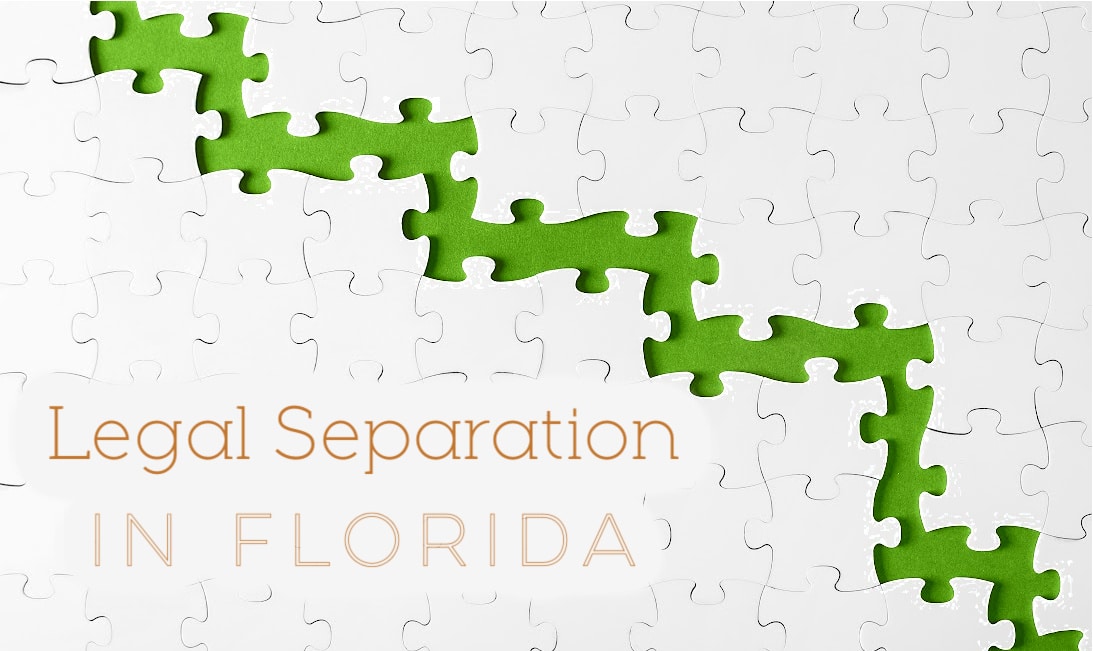This ambivalence often leads couples to wonder if there is a compromise—a middle ground where they can stay married while living apart.
For many, the answer lies in legal separation.
What Is Legal Separation?
Filing for legal separation allows couples to live separate lives—physically and financially—while still remaining married.
Some states require that couples legally separate for a time before filing for divorce. However, some couples choose a trial separation to help determine if divorce is the right step. Still others decide to remain legally separated permanently, as an alternative to divorce.
Legal separations are guided by a separation agreement, which sets rules regarding issues like custody, child support, alimony, and property division but does not terminate the marriage.
Legal Separation In Florida
Unfortunately, Legal Separation is not recognized by the laws that govern Florida family law.
However, this does not mean you must choose between filing for divorce and living happily ever after. You can still choose to live apart and there are even legal mechanisms to address the needs you may have during your separation.
Alternatives To Legal Separation In Florida
In states that recognize them, separation agreements create familial and financial boundaries that are agreed on by both parties and enforced by the court. In other words, they create rules that you are each obligated to follow.
Although Florida does not recognize formal separation agreements, couples wishing to address these needs without getting a divorce do have some options.
The first is to file a Petition For Support Unconnected With a Dissolution of Marriage, also known as a Petition for Support. This petition addresses child support, spousal support, visitation, and custody, while leaving division of assets and debts untouched.
This system is frequently used by couples who were never married to begin with and may work well if you have already decided how to divide your property.
Your second option is to draw up a postnuptial agreement, which works the same way as a prenuptial agreement but is entered into after you get married.
Postnuptial agreements delineate what happens in the event of a future divorce or separation and cover a wide range of issues, from child support and division of property to who leaves the marital home.
You and your spouse would then abide by the provisions set forth in the agreement. Some items in the agreement might be enforceable under civil contract law while other provisions would only be enforceable through the family law court.
It’s worth noting that a judge has the final say on child custody and visitation and they are obligated to act according to the best interests of the child.
Benefits of Legal Separation
Marriages fall apart for a variety of reasons, but deciding whether to (informally) separate or divorce is a different matter altogether.
Some couples opt for separation due to religious reasons or to avoid the stigma of a divorce.
Another, more practical, reason to separate is to retain the financial benefits of marriage.
One spouse may want to retain their health insurance or military benefits that would otherwise become unavailable to them. Staying legally married also allows you to file taxes jointly and take advantage of any benefits associated with joint filing.
Even if you plan on getting divorced in the future, remaining married for a time can maximize your financial benefits in the future. For example, alimony is determined in part by the length of time you were married. Delaying your divorce may increase the amount of spousal support you’re entitled to.
Social security benefits are another area where staying married can be a benefit. If you were married for at least 10 years, you may be eligible to collect the equivalent of one-third to one-half of your ex-spouse’s benefit amount, which can be helpful if this is greater than your benefits.
Finally, separating can give the two of you time and space to decide if a permanent divorce is right for you.
One major downside to a legal separation is that neither of you can remarry until you get divorced.
Regardless of the circumstances that brought you to this point, this is not an easy decision and there are no wrong answers. You should talk to an attorney who can help identify potential bumps in the road and advise you on the many options available to you.
Conclusion
Even though Florida does not recognize formal legal separation, couples who wish to live apart but remain married do have options available to them.
Filing a Petition For Support can enforce issues related to child support and alimony, while a postnuptial agreement can provide a legal framework that paves the way for a future divorce.
Regardless of the path you choose, you will need an experienced divorce attorney like those at Leap Frog Divorce to help you navigate these choppy waters.
Our experience as divorce attorneys has given us keen insight into the many issues that arise during separation and divorce. As a result, we know which questions to ask to bring these issues to light so that you can make informed decisions in confidence.
Whether you’re ready to file for divorce or simply want answers on what lies ahead, we are prepared to provide assistance in whatever way we can. Contact us today to schedule a consultation.





